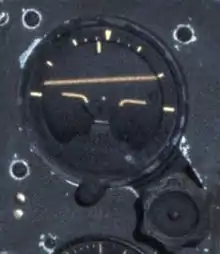 Gyro horizon from a B-24 Liberator | |
| Accident | |
|---|---|
| Date | 2 August 1943 |
| Summary | Controlled flight into terrain (CFIT) |
| Site | New Zealand 36°46′35.06″S 174°38′43.15″E / 36.7764056°S 174.6453194°E |
| Aircraft | |
| Aircraft type | Consolidated C-87 Liberator Express |
| Operator | United Airlines |
| Registration | 41-24027 |
| Flight origin | Whenuapai Aerodrome |
| Destination | RAAF Base Amberley |
| Passengers | 25 |
| Crew | 5 |
| Fatalities | 16 |
| Survivors | 14 |
The 1943 Liberator crash at Whenuapai was an aircraft accident in New Zealand during World War II.[1][2]
History
The Consolidated C-87 Liberator Express aircraft, owned by the USAAF and operated using a United Airlines crew, was transferring Japanese men, women, and children of the Consular Corps, to exchange for Allied POWs.[3] On 2 August 1943, it took off from Whenuapai Aerodrome runway 04 at 2:20 am, with rain and fog conditions at minimums for departure, and quickly passed through low stratus. Captain Herschel Laughlin's gyro horizon had inadvertently been left caged – while the instrument displayed level flight, the aircraft entered a steepening bank to the left.[3] The crew detected the problem in a few seconds, but as the aircraft was straightening up and levelling out, it hit the ground at about 322 km/h (200 mph), bounced a few times and exploded. The third bounce threw its first officer, R. John Wisda, out through the canopy; he rolled end over end about 100 metres (330 ft) through mud and reeds.[3] A medic later found him trying to keep warm near a burning tyre. R. John Wisda survived the crash. The major factors of the accident were the lack of a pre-flight checklist, and crew fatigue (126 flying hours in the last 26 days).
The crash killed three of the five crew (United States nationals), and eleven of the twenty-five passengers (eight Japanese and three Thai nationals).[4] Two additional passengers died later from injuries.[3] TSS Wahine took the surviving internees from Wellington to Sydney three months later.[5][6][7]
TVNZ covered the crash during the programme Secret New Zealand in 2003, and posited the accident was covered up, due to concerns of reprisals against POWs.[8]
Crash site
.jpg.webp)
The aircraft crashed to the ground 1¼ miles NNE of Whenuapai airfield. [9]
References
- ↑ "Airbus crash not on list of casualties". New Zealand Herald. 28 November 2008. Retrieved 20 April 2009.
- ↑ "August 1943 USAAF Overseas Accident Reports". Aviation Archaeological Investigation and Research. Archived from the original on 3 May 2009. Retrieved 20 April 2009.
- 1 2 3 4 Livingstone, Bob (1998). Under the Southern Cross: The B-24 Liberator in the South Pacific. Turner. p. 115. ISBN 1-56311-432-1. Retrieved 20 April 2009.
- ↑ Mackay, Jamie. "Pearce, Edna Bertha 1906 - 1995". Dictionary of New Zealand Biography. Archived from the original on 5 May 2009. Retrieved 20 April 2009.
- ↑ King, John (1995). Aviation Accidents and Disasters. New Zealand Tragedies. Wellington: Grantham House. p. 136. ISBN 1-86934-042-6.
- ↑ Bevan, E. Denys (4 November 1991). "Liberator: The Facts". The Listener.
- ↑ Sim, J. W. (November 1988). "Letter". New Zealand Wings.
- ↑ Roscoe, Bruce (2007). Windows on Japan. Algora. p. 262. ISBN 978-0-87586-491-4. Retrieved 20 April 2009.
- ↑ Ranter, Harro. "ASN Aircraft accident Consolidated C-87 Liberator Express 41-24027 Whenuapai Air Base". aviation-safety.net. Retrieved 19 October 2020.